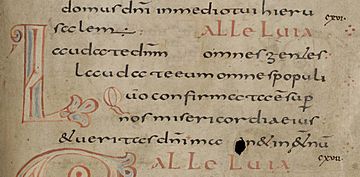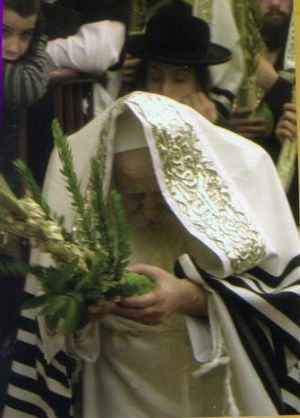Psalm 117 facts for kids
Psalm 117 is the 117th song or prayer in the Book of Psalms in the Bible. In English, it begins with the words: "O praise the LORD, all ye nations: praise him, all ye people." In Latin, it is called Laudate Dominum.
This psalm is very short, with only two verses. It is the shortest psalm and also the shortest chapter in the entire Bible! In some older versions of the Bible, like the Greek Septuagint and the Latin Vulgate, this psalm is known as Psalm 116.
Contents
What is Psalm 117 About?
Psalm 117 is a short but powerful song of praise. It asks everyone, from all nations and peoples, to praise God. It also explains why they should praise God: because of His great kindness and His never-ending truth.
The Shortest Chapter
With just two verses, Psalm 117 is the shortest chapter in the whole Bible. It has only 17 words in the English King James Version. It is the 595th chapter out of 1,189 chapters in that version of the Bible, making it the middle chapter.
King James Version Text
Here is what Psalm 117 says in the King James Version of the Bible:
O praise the LORD, all ye nations:
praise him, all ye people.
2 For his merciful kindness is great toward us:
and the truth of the LORD endureth for ever.
Praise ye the LORD.—Psalm 117 King James Version
How Psalm 117 is Used
Psalm 117 is important in both Judaism and Christianity.
In Judaism
In Judaism, Psalm 117 is part of a special group of six psalms (Psalms 113-118) called Hallel. Hallel is a collection of prayers of praise and thanks. These psalms are recited on important Jewish holidays, like Passover, Shavuot, and Sukkot. When Hallel is recited, Psalm 117 is always included.
In Christianity
Christians also use Psalm 117. They see it as an invitation for all people, not just Jewish people (often called gentiles in the Bible), to praise God. This is seen as a fulfillment of God's promise to Abraham that all nations would be blessed through him. The Epistle to the Galatians in the New Testament mentions this, saying that Abraham's "seed" (meaning his descendant) is Jesus Christ.
The first verse of Psalm 117 is quoted in the Book of Romans in the New Testament (Romans 15:11), showing its importance for all believers.
In Catholicism
In the Catholic Church, Psalm 117 (which is Psalm 116 in their Latin Bible) is used in daily prayers. For example, it is part of the Liturgy of the Hours, which is a set of prayers prayed at different times of the day. It is also sometimes sung after a special service called Benediction of the Blessed Sacrament.
Musical Settings of Psalm 117
Because of its powerful message, many composers have set Psalm 117 to music. When set to music, it is often known by its Latin name, Laudate Dominum.
Some famous composers who have created music for Psalm 117 include:
- William Byrd
- Johann Sebastian Bach (in his work Lobet den Herrn, alle Heiden, BWV 230)
- Wolfgang Amadeus Mozart
- Alan Hovhaness
- Fredrik Sixten
The psalm also appears in popular music. For example, it forms the introduction to the 1990s pop song "Happy Nation" by the Swedish group Ace of Base. A popular musical arrangement of Laudate Dominum also comes from the Taizé community, which is known for its meditative and simple songs.
See also
 In Spanish: Salmo 117 (116) para niños
In Spanish: Salmo 117 (116) para niños
 | Valerie Thomas |
 | Frederick McKinley Jones |
 | George Edward Alcorn Jr. |
 | Thomas Mensah |



